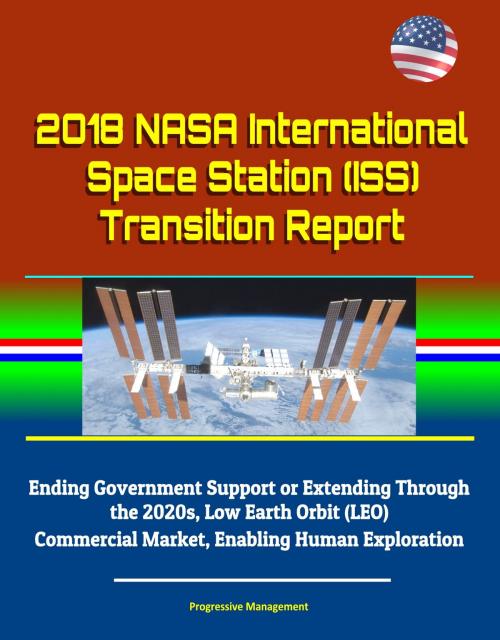2018 NASA International Space Station (ISS) Transition Report - Ending Government Support or Extending Through the 2020s, Low Earth Orbit (LEO) Commercial Market, Enabling Human Exploration
Nonfiction, Science & Nature, Technology, Aeronautics & Astronautics, Science, Physics, Astrophysics & Space Science| Author: | Progressive Management | ISBN: | 9780463672662 |
| Publisher: | Progressive Management | Publication: | June 8, 2018 |
| Imprint: | Smashwords Edition | Language: | English |
| Author: | Progressive Management |
| ISBN: | 9780463672662 |
| Publisher: | Progressive Management |
| Publication: | June 8, 2018 |
| Imprint: | Smashwords Edition |
| Language: | English |
This excellent 2018 report has been professionally converted for accurate flowing-text e-book format reproduction.
This report responds to direction in the National Aeronautics and Space Administration Transition Authorization Act of 2017 to submit to Congress a report evaluating the International Space Station (ISS) as a platform for research, deep space exploration, and low-Earth orbit (LEO) spaceflight in partnership with its four foreign space agency partners, and the commercial space sector.
The ISS represents an unparalleled capability in human spaceflight that is increasing knowledge of engineering and physical sciences, biology, the Earth, and the universe. This knowledge is benefiting life here on Earth and enhancing the competitiveness of U.S. private industry. The research and technology demonstrations onboard the ISS are not only providing the basis for extending human presence beyond the bounds of LEO and taking America's next steps into the proving ground of cislunar space, but also advancing the competitiveness of U.S. private industry. Building on the partnership of five space agencies representing the 15 ISS Intergovernmental Agreement signatory nations, over 101 countries and areas have utilized, or are currently utilizing, the ISS. Astronauts have continuously lived aboard the ISS for over 17 years. Approximately one-quarter of the U.S. population today only knows a time when Americans have lived in space.
This report lays out NASA's activities and future plans for operations, research, and development in LEO. "Transition," (Section 3), as that term is used in Section 303 of the NASA Transition Authorization Act of 2017, discusses the LEO capabilities that the ISS currently provides the Nation, which include a sustained American presence in LEO, sustained American global space leadership, the continued development of a commercial space industry and a commercial space marketplace, the continued development of deep space exploration capabilities, and the continued return of research and development benefits to humans on Earth. "Transition" also discusses what NASA envisions the LEO landscape to look like in 2024 and beyond, as well as the key issues that need to be considered when contemplating ISS end-of-life and transition to other platforms. "Major Elements of Transition" (Section 4) goes into detail on the LEO commercial marketplace, the ISS's role in the expansion of humanity into deep space, the benefits currently being returned to Earth from research on ISS, and an evaluation of the technical and cost implications of continuing to operate ISS through and beyond 2024. Section 5 provides a Summary.
This excellent 2018 report has been professionally converted for accurate flowing-text e-book format reproduction.
This report responds to direction in the National Aeronautics and Space Administration Transition Authorization Act of 2017 to submit to Congress a report evaluating the International Space Station (ISS) as a platform for research, deep space exploration, and low-Earth orbit (LEO) spaceflight in partnership with its four foreign space agency partners, and the commercial space sector.
The ISS represents an unparalleled capability in human spaceflight that is increasing knowledge of engineering and physical sciences, biology, the Earth, and the universe. This knowledge is benefiting life here on Earth and enhancing the competitiveness of U.S. private industry. The research and technology demonstrations onboard the ISS are not only providing the basis for extending human presence beyond the bounds of LEO and taking America's next steps into the proving ground of cislunar space, but also advancing the competitiveness of U.S. private industry. Building on the partnership of five space agencies representing the 15 ISS Intergovernmental Agreement signatory nations, over 101 countries and areas have utilized, or are currently utilizing, the ISS. Astronauts have continuously lived aboard the ISS for over 17 years. Approximately one-quarter of the U.S. population today only knows a time when Americans have lived in space.
This report lays out NASA's activities and future plans for operations, research, and development in LEO. "Transition," (Section 3), as that term is used in Section 303 of the NASA Transition Authorization Act of 2017, discusses the LEO capabilities that the ISS currently provides the Nation, which include a sustained American presence in LEO, sustained American global space leadership, the continued development of a commercial space industry and a commercial space marketplace, the continued development of deep space exploration capabilities, and the continued return of research and development benefits to humans on Earth. "Transition" also discusses what NASA envisions the LEO landscape to look like in 2024 and beyond, as well as the key issues that need to be considered when contemplating ISS end-of-life and transition to other platforms. "Major Elements of Transition" (Section 4) goes into detail on the LEO commercial marketplace, the ISS's role in the expansion of humanity into deep space, the benefits currently being returned to Earth from research on ISS, and an evaluation of the technical and cost implications of continuing to operate ISS through and beyond 2024. Section 5 provides a Summary.















